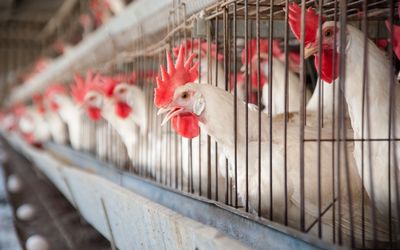Don’t let chicken wars get in the way of Agoa
by Xavier Carim,
2014-03-25 05:28:45.0
IN RECENT weeks, chicken producers in the US have reportedly called for their government to withdraw South Africa’s duty-free benefits under the African Growth and Opportunity Act (Agoa). This comes at a time when Agoa, the centrepiece of US commercial relations with sub-Saharan Africa, is under review before its expiry on September 30 next year.
It should be noted that, aside from the views of US chicken producers, most US business interests and associations have supported Agoa’s extension and South Africa’s continued inclusion in the programme.
Indeed, the review is likely to demonstrate that South Africa and the US have strong, mutually beneficial bilateral trade and investment relations overall. The benefits of Agoa flow both ways.
Last year, the US was South Africa’s second-largest export market and fourth-largest source of imports. Total bilateral trade last year was valued at R129.7bn, surpassing precrisis level of R122bn in 2008. South Africa was the US’s top export market in sub-Saharan Africa — the second-fastest-growing region in the world — in 2012.
Two-way investment increased to R1-trillion in 2010, while about 600 US companies do business in South Africa.
According to US data, South Africa’s exports under Agoa (including the Generalised System of Preferences) were valued at $3.6bn last year. Importantly, 42% of our exports to the US enter duty-free under Agoa and this covers mainly manufactured goods. Agoa clearly plays a vital role in supporting South African jobs and industrialisation objectives. South Africa’s exports under Agoa also provide products to US consumers at competitive prices.
By one estimate, Agoa generated about 350,000 direct jobs and 1.3-million indirect jobs in sub-Saharan Africa, while creating about 100,000 jobs in the US. In South Africa, Agoa created 62,395 jobs directly and indirectly. Agoa also supports integration objectives in Africa by establishing regional value chains. For example, South Africa exports some apparel trims (zips, buttons, thread, tapes and elastic) to countries such as Lesotho, which produce apparel for export to the US under Agoa.
As with all trade relations, challenges arise, including antidumping measures, which are legitimate policy instruments available to all World Trade Organisation (WTO) members. Both the US and South Africa resort to these measures to protect domestic industries from unfairly priced imports. The US maintains antidumping duties against certain South African exports and, in all cases on both sides, substantive and procedural rules as established in the WTO are followed in application of the instrument.
US chicken producers have mistakenly claimed that the methodology used by South Africa in calculating antidumping duties on US imports of chicken portions (the so-called weight-based allocation) is illegal under WTO rules. In making this argument, reference is made to a recent decision by a WTO dispute panel on a similar matter between the US and China.
The US prevailed in that case, but for reasons not related to the methodology. Indeed, the panel said methodologies based on "sales value" or "weight" are not unreasonable and clarified that South Africa’s practice is not inconsistent with WTO rules.
Rather than pursing unfounded arguments, US chicken producers would have been well advised to take advantage of the invitation to fully participate in the investigation that preceded the decision to impose antidumping duties on US imports of chicken portions.
Unfortunately, during the investigation and in the subsequent reviews of the duty, US chicken producers did not provide any information to counter the claim that their exports were being dumped in the South African market.
South Africa fully observes the rule of law in international trade and adheres to the commitments agreed to by all members of the WTO. While US chicken producers are entitled to seek to grow their exports to South Africa, this has to be pursued in the framework of agreed international trade rules.
The argument that South Africa does not respect trade rules is groundless and the threat to oppose South Africa’s future inclusion in Agoa should not be allowed to overshadow the reality of a healthy, strong and growing trade and investment relationship between South Africa, sub-Saharan Africa and the US, forged as it has been through Agoa.
For these reasons and in line with sub-Saharan Africa’s common view, South Africa continues to support the reauthorisation of Agoa for at least 15 years.
• Carim is deputy director-general for international trade and economic development in the Department of Trade and Industry.

Picture: THINKSTOCK
IN RECENT weeks, chicken producers in the US have reportedly called for their government to withdraw South Africa’s duty-free benefits under the African Growth and Opportunity Act (Agoa). This comes at a time when Agoa, the centrepiece of US commercial relations with sub-Saharan Africa, is under review before its expiry on September 30 next year.
It should be noted that, aside from the views of US chicken producers, most US business interests and associations have supported Agoa’s extension and South Africa’s continued inclusion in the programme.
Indeed, the review is likely to demonstrate that South Africa and the US have strong, mutually beneficial bilateral trade and investment relations overall. The benefits of Agoa flow both ways.
Last year, the US was South Africa’s second-largest export market and fourth-largest source of imports. Total bilateral trade last year was valued at R129.7bn, surpassing precrisis level of R122bn in 2008. South Africa was the US’s top export market in sub-Saharan Africa — the second-fastest-growing region in the world — in 2012.
Two-way investment increased to R1-trillion in 2010, while about 600 US companies do business in South Africa.
According to US data, South Africa’s exports under Agoa (including the Generalised System of Preferences) were valued at $3.6bn last year. Importantly, 42% of our exports to the US enter duty-free under Agoa and this covers mainly manufactured goods. Agoa clearly plays a vital role in supporting South African jobs and industrialisation objectives. South Africa’s exports under Agoa also provide products to US consumers at competitive prices.
By one estimate, Agoa generated about 350,000 direct jobs and 1.3-million indirect jobs in sub-Saharan Africa, while creating about 100,000 jobs in the US. In South Africa, Agoa created 62,395 jobs directly and indirectly. Agoa also supports integration objectives in Africa by establishing regional value chains. For example, South Africa exports some apparel trims (zips, buttons, thread, tapes and elastic) to countries such as Lesotho, which produce apparel for export to the US under Agoa.
As with all trade relations, challenges arise, including antidumping measures, which are legitimate policy instruments available to all World Trade Organisation (WTO) members. Both the US and South Africa resort to these measures to protect domestic industries from unfairly priced imports. The US maintains antidumping duties against certain South African exports and, in all cases on both sides, substantive and procedural rules as established in the WTO are followed in application of the instrument.
US chicken producers have mistakenly claimed that the methodology used by South Africa in calculating antidumping duties on US imports of chicken portions (the so-called weight-based allocation) is illegal under WTO rules. In making this argument, reference is made to a recent decision by a WTO dispute panel on a similar matter between the US and China.
The US prevailed in that case, but for reasons not related to the methodology. Indeed, the panel said methodologies based on "sales value" or "weight" are not unreasonable and clarified that South Africa’s practice is not inconsistent with WTO rules.
Rather than pursing unfounded arguments, US chicken producers would have been well advised to take advantage of the invitation to fully participate in the investigation that preceded the decision to impose antidumping duties on US imports of chicken portions.
Unfortunately, during the investigation and in the subsequent reviews of the duty, US chicken producers did not provide any information to counter the claim that their exports were being dumped in the South African market.
South Africa fully observes the rule of law in international trade and adheres to the commitments agreed to by all members of the WTO. While US chicken producers are entitled to seek to grow their exports to South Africa, this has to be pursued in the framework of agreed international trade rules.
The argument that South Africa does not respect trade rules is groundless and the threat to oppose South Africa’s future inclusion in Agoa should not be allowed to overshadow the reality of a healthy, strong and growing trade and investment relationship between South Africa, sub-Saharan Africa and the US, forged as it has been through Agoa.
For these reasons and in line with sub-Saharan Africa’s common view, South Africa continues to support the reauthorisation of Agoa for at least 15 years.
• Carim is deputy director-general for international trade and economic development in the Department of Trade and Industry.























Change: -0.47%
Change: -0.57%
Change: -1.76%
Change: -0.34%
Change: 0.02%
Data supplied by Profile Data
Change: -1.49%
Change: 0.07%
Change: -0.47%
Change: 0.00%
Change: 0.04%
Data supplied by Profile Data
Change: 0.43%
Change: 1.16%
Change: 0.65%
Change: 0.15%
Change: 1.17%
Data supplied by Profile Data
Change: 0.02%
Change: -0.63%
Change: 0.00%
Change: -1.22%
Change: -0.87%
Data supplied by Profile Data